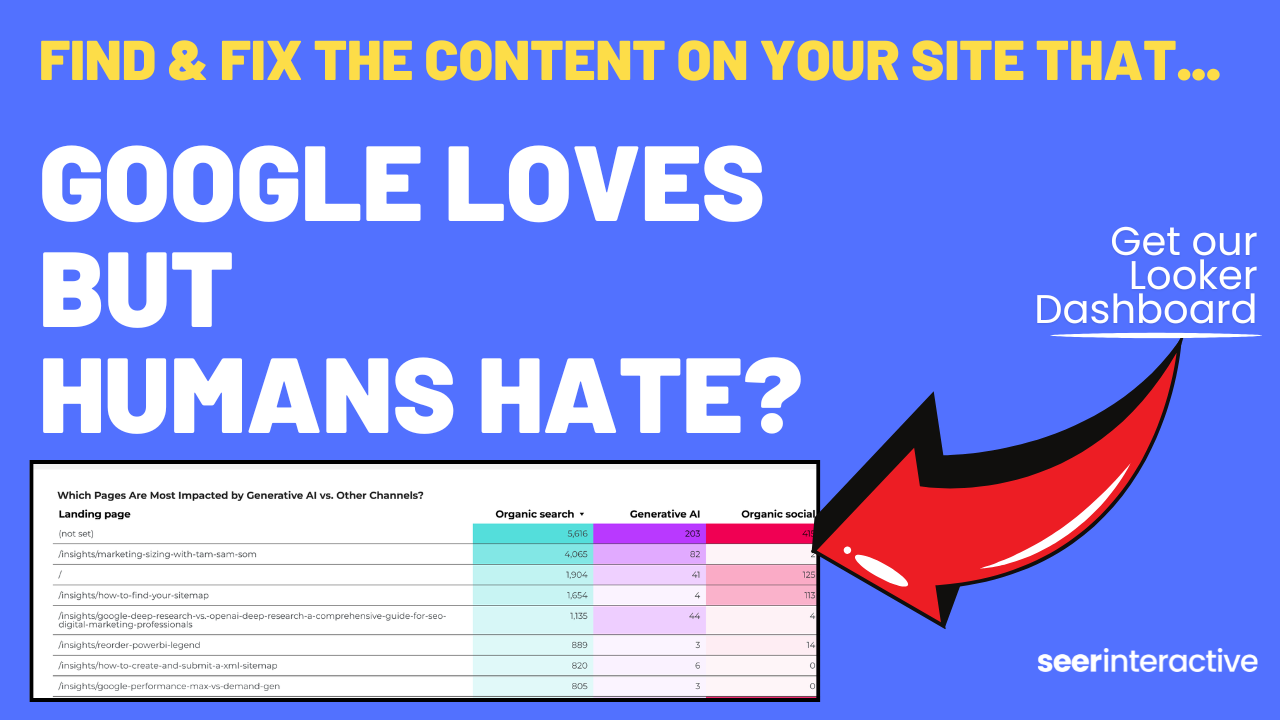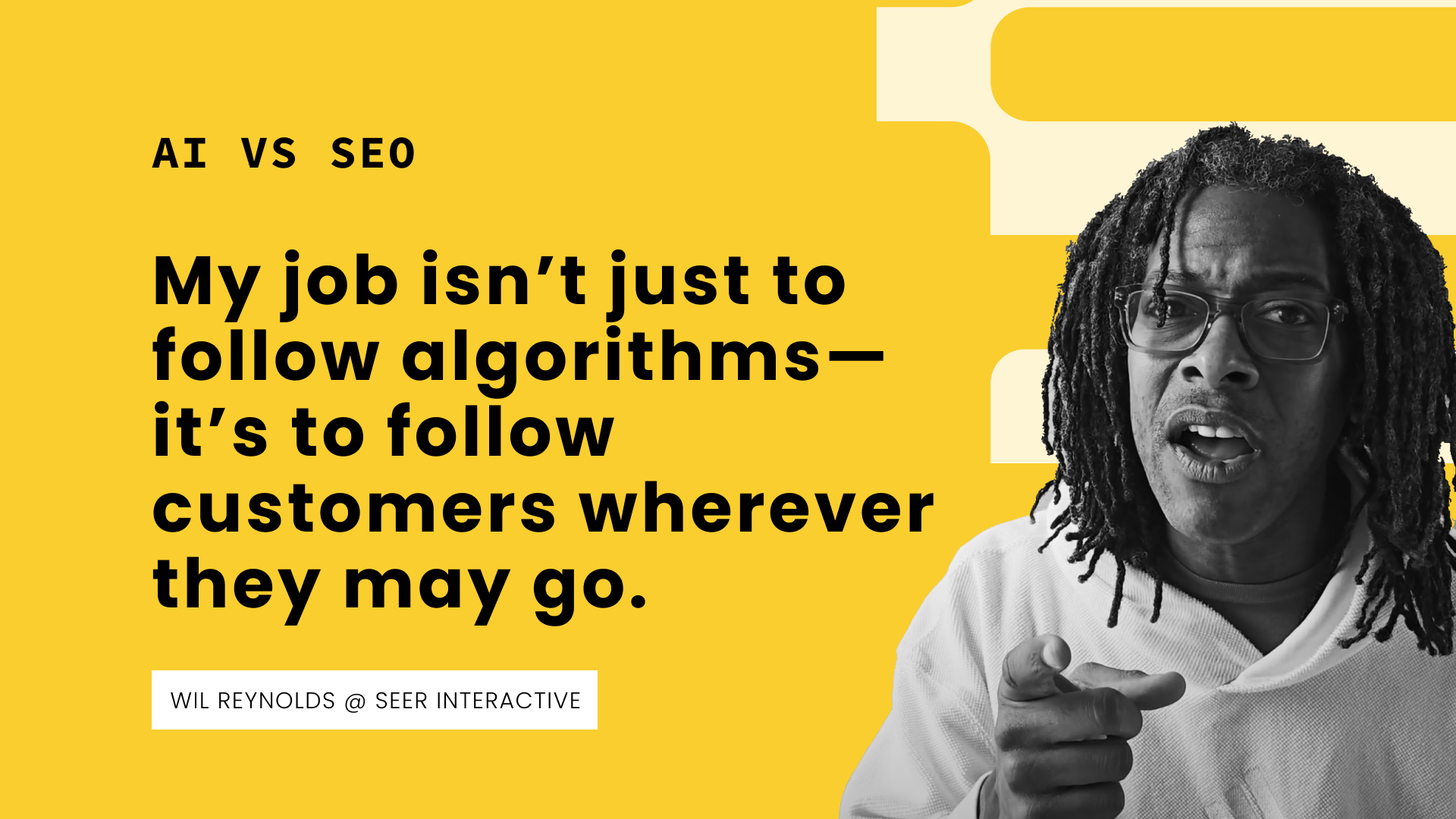“What if I woke up tomorrow and search engines as we know them were gone, an SEO Apocalypse?”
I have made promises to clients for search work and suddenly search doesn’t exist. People can’t search Google or Bing “search” anymore and we all used LLMs what would I do to help my clients to grow sales in this new world?
I like going to this extreme because it keeps me focused on the outcome, there is no:
- Maybe 50% of people use LLMs / chat for search
- Maybe navigational searches stay but informational searches drop
- Maybe 1 year from now it’s only 10% but 5 years from now 80%
All this complexity doesn’t get us started on the brain exercise, instead we stay wrapped up in “maybes”, so I just eliminate all that and go to 0 search engines, tomorrow.
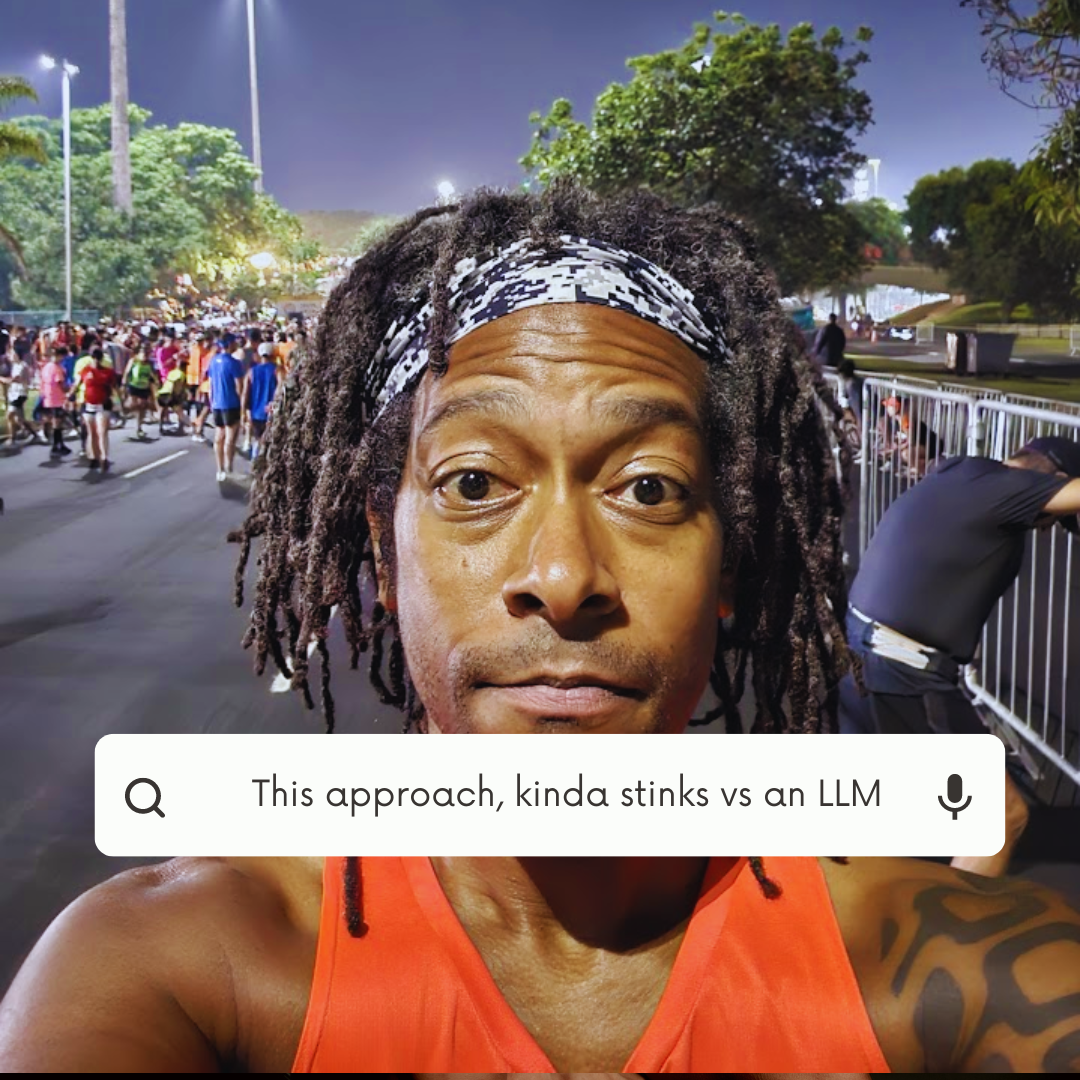
"The prediction I am making here is that once people learn to put their multiple roles/contexts into their prompts they won’t go back to the old way."
Here’s what I would do the day after the SEO apocalypse & why.
The big prediction on the reduction of influence of SEO and Organic Search
Gartner is claiming that 50% of all organic searches will be gone by 2028. Whether they are going to be wrong or right is not relevant for this thought exercise.
Controlling for lack of curiosity
Personally, I have no reason to believe that humans are going to be less inquisitive by 2028, meaning the itch is there, it’s just going to be scratched in new ways. Search engines are an efficient way to get answers but we’re not going back to Encarta people!
People still have a desire to learn new things, from cooking to code.
The questions we should ask ourselves…
- How do people retrieve information in this future state where search engines do not exist?
- What is my role in that world?
- What information an data do I have to let me prepare myself and my clients for that future?
- How do I help my client to win?
- What is winning?
- What SEO KPI’s don’t serve my business strategy anymore and could be false positives?
How do people retrieve answers to questions in a search engine less world?
I’m going to start with the hotness of the day, chat based search: Gemini, Perplexity, ChatGPT, any of them.
For this exercise, I am going to ignore other ways (reddit, closed groups, wikipedia, etc).
Skip to the strategy part below if you want.
Here I am going to use historical context to drive strategy.
What is my role as a search professional in a search engine-less world?
It appears to me that chat search, like traditional search, requires an index of information that sits somewhere to be retrieved based on a customer's query.
That requires the following:
Why search and thus SEO & Paid is the most broken way to get this information in a chat world.
In traditional search, you, the human, click on multiple listings and have to mentally store & process several inputs (web pages) and then collapse all that quick learning into an answer in your brain.
It's just a better experience
In a chat search engine or LLM, your query remixes 1000’s or 10,000’s of documents into 1 answer, relieving you, the human, of the set of mind numbing tasks that have nothing to do with getting the answer. Search, scan, click, read, process, click back button, go to listing 2, click, read process, new query, over and over again.
Google already improved UX with answer boxes
Why click on a bunch of sites (with a bunch of friction in the form of images, ads, popups, etc), to find out when valentine's day is? They could just serve the answer? So they did, and guess what? There’s no ads on many of those either (we’ll get to ad inventory later)
Well now LLMs are doing the same thing just at a much different scale.
LLMs are still taking this plethora of data but they avoid the friction problem, instead they remix it into an answer based on your question so you don’t have to do 5-10 searches and hit 20 sites to figure out an answer..
Wait, LLM’s and chat search still needs rankings? I think so.
They can’t use every piece of information they have because that would just be too long of an answer. In the same way that a search engine has to choose which 10 if of the 1million pages I have on this topic will I choose to show you, LLMs do the same thing. That is the ranking part, whether it is a chat search engine or a traditional search engine, rankings matter.
That means I SEO still has a role…
I now help my clients documents, or the documents that mention my client with accurate information to show up as high for as many types of queries as I can, which means if I can understand the roles and context of people searching in LLMs I can get crackin.
New Era: Search terms + prompt dissection FTW?
It’s pretty commonplace when looking at generative AI as a way to get answers to questions to use some kind of prompting framework. Below you can see Hubspot’s breakdown. Context, Task, Instructions, Clarity & Refine. There are many, you can check others out here.
Imagine buying a car, deep down I wonder how many people search for “suv under 50,000” and that’s their only query, they then Google the brand, click on an ad and buy?
I doubt that is how people buy for the following reasons:
The Google autocomplete shows that people search in a lot of unique ways for a car, and we all have needs unique to our situation, these “with” suggestions give context, but look at all the other “context / role clues left behind, meaning we got some content building work to do, maybe.
Technically Google fails at complex role / context queries all jumbled into 1 long query, but it is better than the alternative (going to a car lot and talking to sales people). It is full of friction and extra work for the searcher though.
A whole new world
LLMs unlock your ability to add multiple roles and contexts to get a singular set of answers without having to do 8-20 queries, hit 20 sites, avoid ads avoid fluff content, and try to find the answer.
Now imagine a world where you take all those factors that matter specifically to YOU and roll them up in 1 long query?
Below, I highlight what could be up to 9 queries to get 1 answer to the question, which SUV should I buy? In a chat world 9 queries become 1. This has broad implications for SEO, traffic from SEO, other SEO related KPIs, and Paid Search.
Strategic impacts, early mover advantage for businesses
Keep in mind as of today, many of the answers generated by these AI search experiences come from crawling the web at some point in time. Meaning document discovery & retrieval along with a way to rank those documents still matters.
Slow to update LLMs create answer moats
Those LLMs aren’t always up to date, ChatGPT 4 is operating on a database from April 2023, which is 8 months old. They are at times using RAG (Retrieval Augmented Generation) to help get more recent information but not always. Here are examples of various LLMs trying to answer the question what is the score of the Superbowl (at halftime).
Going back to our SUV example - Lets look at Bing Co-pilot in its current state…
Turning this into a strategy TODAY
Today use paid search query reports to understand context and roles that will end up in prompts in the future.
Gather your "owned data" and get more value from it. You already paid for those clicks, turn it into value.
Use your search query reports to find the unigrams of “with”, “for”, and other searches (maybe “by” “in” or others) to understand context and roles around your major keywords.
The unigrams “With” and “for” can tell you the following:
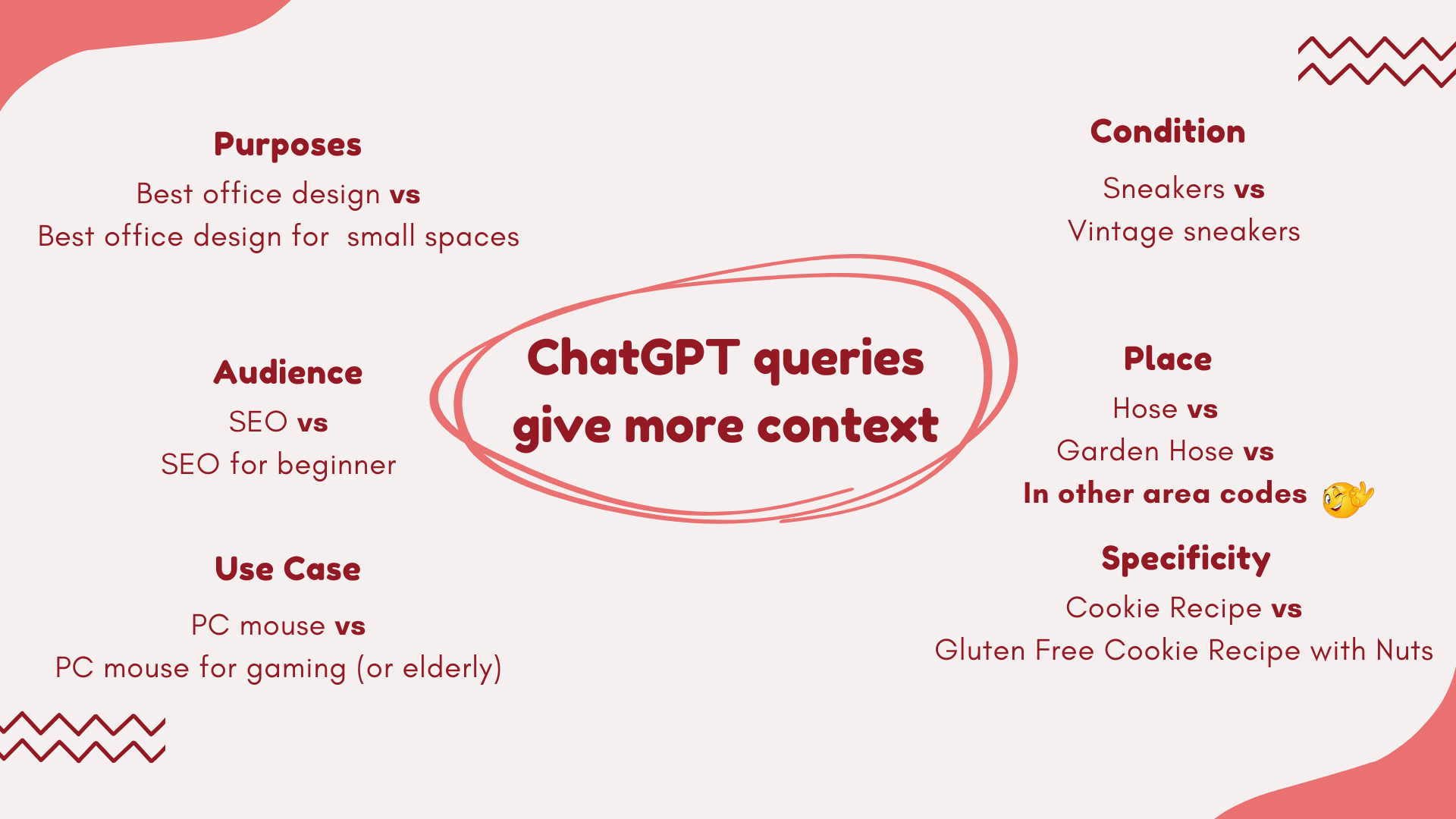
Now you have the roles and context that your customer is using, this is the beauty of search query reports vs keywords an SEO picks, you are hearing directly from your customer and you have a likelihood of conversion when that role is put in as well. In that single report you learn what your customers context and roles are, and how well you answer it.
If I was in paid search, I’d be asking / planning for...
In a world with fewer queries, is there less ad inventory on Google and more competition?
If we live in a world where people are “rolling up” 8 searches into 1, then there’s less ad inventory.
Now we have the same group of marketers with the same budgets, and the same goals fighting over fewer eyeballs.
What does this mean for my paid media strategy?
What does this mean for my cost to get in front of a customer?
What happens when Google can’t see this customer because they started using the ChatGPT environment (which makes sense for Open AI to be launching a search engine). How does “in market” change?
Might this be why they are touting growth in YouTube & YouTube TV? For now, video is the least ad channel hardest to disrupt with AI, whereas search is in the crosshairs. I wonder if they’ll be pressing even more on selling YouTube?
Build the content for roles and context today as a hedge for the future
Lets say Gartner is wrong, don’t you want to improve your visibility in Google search today by executing now on the longer tail of content? My belief is that you need to double down on quality content production now, sure you will capture traffic today, but you might just become the answer for months in chat search engines for queries that don’t use RAG, and that ranking is a moat until the next update, which could be 8 months away.
Just like when search engines first started, if the index only updated once every 3 months for the first 2 years, when you got in, you could kick back and chill because the “better” answer couldn’t even get in for 3 or 6 months.
Lean in to AI hard…build your own Custom GPT and embed it on your site
Let's play out the Capital One example above.
You wrote content good enough to get you into the LLM’s answers for queries related to car buying and college.
With that social proof, I would consider doubling down on as many of the roles / context combinations as possible, NOW.
Let's say Capital one builds 300+ quality pages for various roles / content combinations. That moat could sit for a while.
LLMs will result in less traffic my ass, turn less traffic into more owned traffic, build a custom GPT!
So what, with the little traffic you will get, you gotta figure and think in new ways to maximize it.
If I was helping Capital One here and they made the 300+ pages around car buying I would take those pages and also put it into a CustomGPT all about car buying.
When the few people that do get to my site from Co-pilot or Perplexity I would consider changing my site based on referral string. If the user comes from an LLM, then show them the content, but also tell them to try out our “Ask more questions” feature which is loaded with my 300 pages on car buying.
I would then turn that into a MASSIVE moat, if it worked. Take less traffic and turn it into more traffic, go on the offense!!
Don't take this less traffic BS lying down.
As they ask more questions to MY BOT while they are on MY SITE, with MY Custom GPT, I get to do a LOT of moat building things :)
We built this custom GPT for our screaming frog guide you tell me which one is better for your use case the text one or the CustomGPT one? Or both?
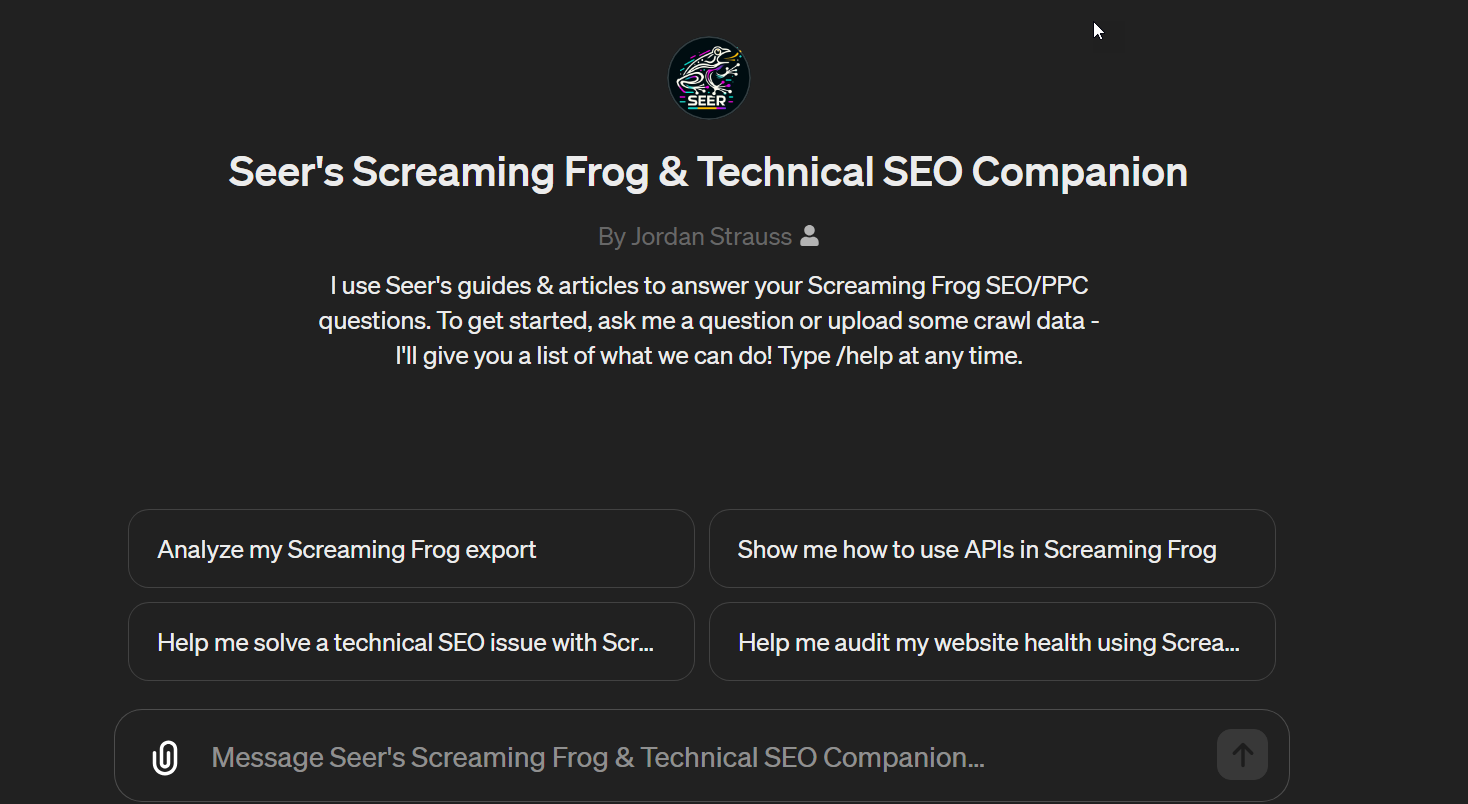
You build that moat, you get value!
Learn: I get to capture queries, learn more about my customers and what they are seeking and it is all my data on my site.
Build content: Commit to getting answers for questions you don’t answer well. In a world where performance max takes search term visibility and chat bots do the same, suddenly you have a mechanism to re-capture customer queries, which helps you to learn more about what the market is seeking.
Beat your competitors: If I can keep them asking questions on my CustomGPT guess where they aren’t going? Back to ChatGPT or even worse Bing or Google to get exposed to publishers who will sell ads for other banks I have to compete with in ad auctions. It also gives those sites more in market information to improve their targeting. I know this is a reach but, I’m trying to think of the value I create in this future world and how I would do it.
A new way to understand your customer
If you can capture “chat” style queries you will learn MORE about customers. Datos is doing this and I think it will be big. Here is part of a study Rand Fishkin partnered with them on to look at people’s prompting behaviors.
People on chat search engines will tell the search box more about their situation than ever and it will be all strung together in one long query.
The days of using analytics to try to see a persons path across pages might be impacted, they are no longer getting your SUVs under 35,000 page, then googling and getting your SUVs with third row page, then googling and getting to your Subaru Outback vs Honda CRV where you are trying to stitch that user behavior together in a world without cookies.
Bring it on, here's your first steps!
1 - Get context & role clues - Gather all your for and with keywords, what % of your cost, conversions, and total search terms contain them across all clients.
2 - Take all those for keywords and map them to competitors - who owns the most “for” keywords might be better positioned for winning in a more context query world.
3 - How do you compare?
Watching every clients back in 10 min a month
The beauty of our data platform is that once I had this idea I built a version to scan every client (took me 15 minutes), and update me, now I can watch every clients back if this is something they want to keep an eye on. (You can sign up for the beta, in house, agency doesn't matter).
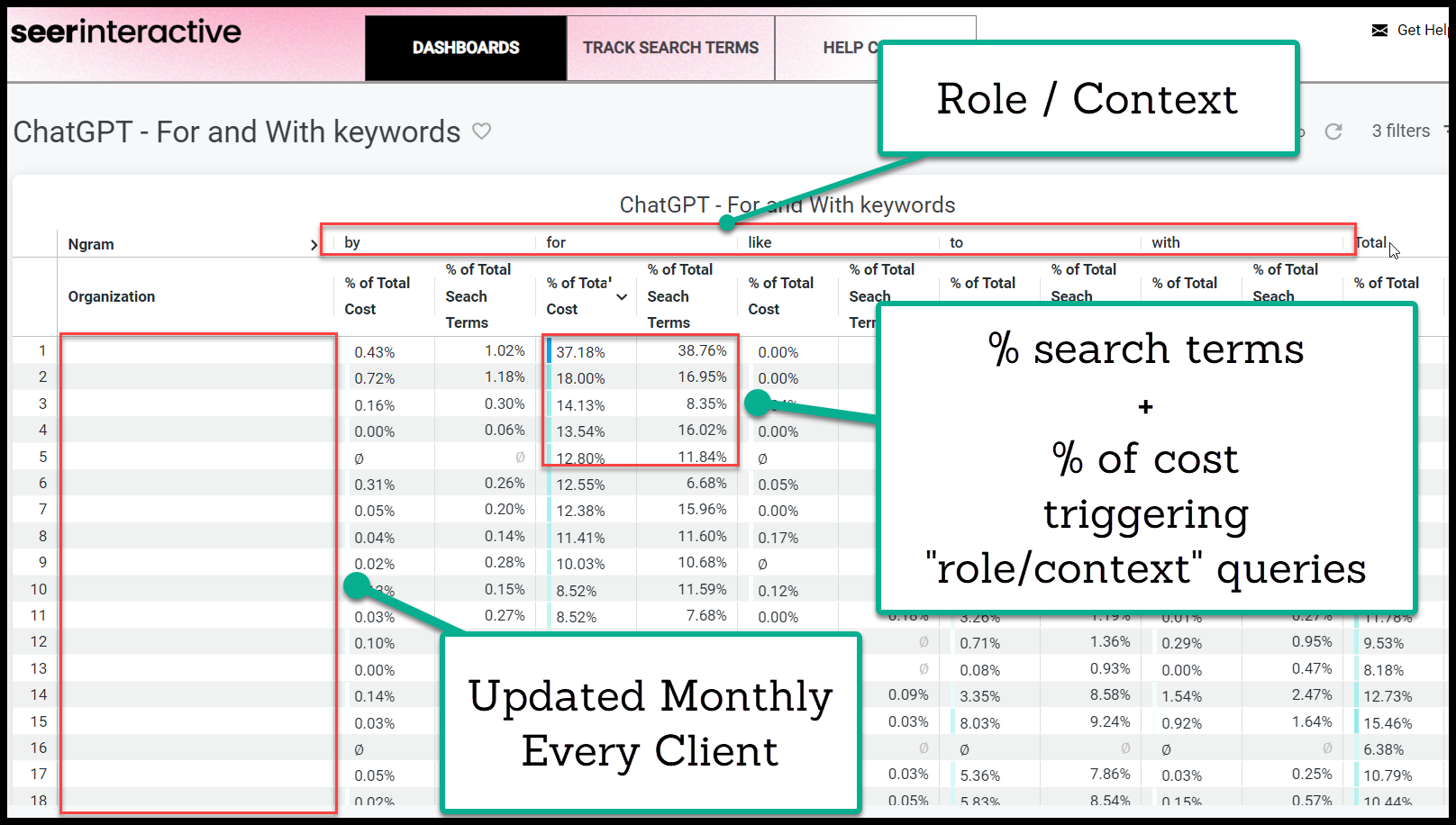
The conclusion:
Search volumes decrease, but the desire for humans to find answers to questions remains.
There is less traffic, maybe fewer ads in this new world, there are fewer links to your content in this world.
For some people this might mean, we should produce less content because we won’t get the traffic. I'm not so sure about that. I think "SEO thinking" still plays a major role in this future.
If you are one of the few sites that gets in front of people early, and you have the content to back it up, the better your content is the less likely they are to have to visit a bunch of others sites to keep drilling down. The earlier you get in front of them with your own hosted answers those 1st party cookies could become a competitive advantage?
Execute. This is your opportunity to beat Goliath if you are David.

